Review
London Film Festival 2010:
live-action short films
Dylan Cave rounds up the best live shorts across five thematic programmes at this year’s LFF
In 2006, newly appointed London Film Festival shorts programmer Philip Ilson declared “death to short film”. Rejecting the formulaic filmmaking evoked by the cliché of the nebulous ‘calling card’, he and co-programmer Simon Young re-imagined the LFF live-action shorts programmes as must-see thematic explorations of youth, love, loneliness, sex, damage and death.
Five years on, the programmers continue to assemble films with thematic ambitions beyond that of the familiar ‘late night horror / comedy’ showcase. Set alongside intelligent animation programmes, this year’s programmes were remarkable because of the subtle thematic structures that unified their diverse choice of short films.
Pretty Girls Make Graves
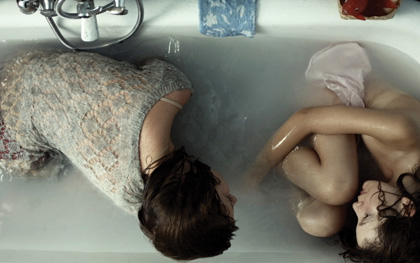
Venus vs Me
The first programme, a collection of stories linking young women to pain and chaos, was thematically the most outlandish and also best titled. Opening film Venus vs Me (Nathalie Tierlinck, 2009) traced the emotional breakdown of 12-year-old Marie as she juggles puberty and the presence of a new man in her mother’s life. Through painful close-ups and dizzying soft focus, Venus vs Me typified the mix of youthful innocence and deadly consequence evoked by the programme title.
So too did Michael Rittmannsberger’s Austrian drama Sister (2010). Essentially a tableau of grief as a young girl realises her sister has drowned, Sister gained dramatic weight with brooding strings that gave the film an unexpected gravitas over its brief six minutes. Depending on your disposition, the film either engrosses through its devastating aesthetics or appalls by the ease with which it emotionally manipulates the viewer to mourn a fabricated situation.
Less orchestrated, but equally affecting, the programme’s final film Release the Flying Monkeys (Alex Taylor, 2010) centred on the external carnage brought by two Eastern European girls preparing East London for the coming of Jesus. Directed and produced by the team behind last year’s award-winning Kids Might Fly, the film is a comic take on the East End’s melting pot of international cultures, with daft but exuberant performances from its female leads.
We’re the Kids from Suburbia
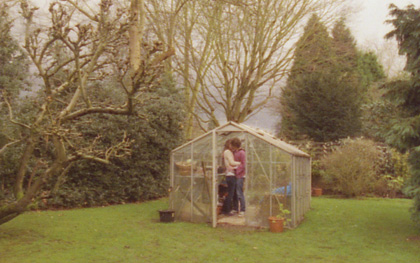
Nulepsy
If short film stories are developed from the experiences of their makers, it comes as little surprise that coming-of-age tales feature heavily. Ilson emphasised this idea with an exploration of suburban life and the discontent of middle-class kids, in a programme which hit its stride with Derby (Paul Negoescu, 2010), a Romanian comedy of manners played as mundane tragedy.
Mircea (Bogdan Voda) is a bored father who hovers listlessly around the house when his 15-year-old daughter invites her new boyfriend for a meal. Barely containing his embarrassment at what he imagines his daughter may be up to in her room, he unfolds his nagging unease in a short-tempered argument about football with the boyfriend. Perfectly pitched performances made the film a delight.
Jessica Sarah Rinland’s Nulepsy (2010) is ostensibly a documentary about a form of narcolepsy that involves stripping naked. It blends confessional voiceover with a range of techniques that sometimes explain, and sometimes parodies, documentary conventions. But the topic is completely fictional: ‘nulepsy’ is a fabricated condition that Rinland uses to explore her real subject – the fragility of documentary truth. Her technique is subtle and completely convinces; it’s only during the final shots that suspicions about the validity of nulepsy emerged in my mind.
Less convoluted, but equally challenging, was Fyzal Boulifa’s Burn My Body (2010). British teenager Hana rebels against her father by removing her headscarf in public but her naivety leads swiftly to tawdry sex with a predatory boy. The film’s implicit link between Hana’s removal of her headscarf and an immediate sexual encounter is slightly overwrought, especially in comparison to the low-key nuances of Derby. But Boulifa is a strong filmmaker. His pervious short, Whore (2008), justly won wide acclaim and although Hana’s rebellion may seem extreme and unfortunate, Burn my Body is expertly directed.
Close Friends and Family Only
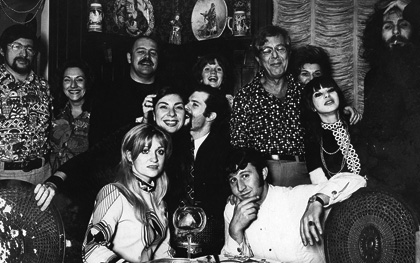
Quadrangle
Simon Young’s programme explored the intense love and bitter hatred found in our relationships with the people close to us – and in Amy Grapple’s Quadrangle (2010) he found a film that documented it all. The title refers to two couples that swapped partners in the early 70s under the impression that they were making a new type of family. 40 years on, they no longer talk. Grapple splits the screen, allowing one of the participants, Deanna, to recite her story in one half of the frame while her ex-husband, Paul, gives his version on the other. Together we’re able to compare and contrast their different opinions on the events and see how their relationship, once full of love, has crumbled into resentment.
Bernard Attal’s fictional A Bike Ride (2009) also featured a separated couple but was less fraught. Told from the perspective of the couple’s little girl, the film follows the daily bike ride she takes through Brooklyn with a father who no longer lives at home. Without forgetting the pain that breakups can have on a family, A Bike Ride was sanguine about the ways relationships change.
A degree of optimism could also be found in Rupert Friend’s Steve (2010), a simple tale about a lonely neighbour (Colin Firth) who invades the fraught household of a twentysomething couple played by Keira Knightley and Tom Mison. Friend called in favours from his showbiz chums, but his screenplay and direction are confident and controlled. Never one to overkill a performance, Firth plays his uncharacteristically nerdy part with the right degree of eccentricity and vulnerability.
A Working Class Hero Is Something To Be
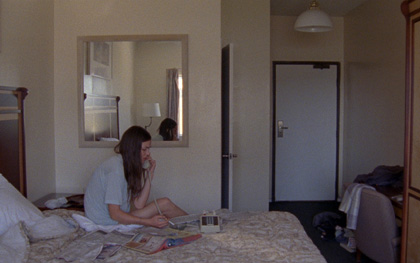
Going Back
Each film in this programme, a series of working-class character studies from around the world, was worthy of mention, but three in particular stood out.
Set in an edge-of-town motel and diner, Adam Keleman’s Going Back (2009) documents the remaining few minutes that failed Los Angeles model Lorna (Lauren Glazier) has to herself before returning to her quiet hometown and meeting the people she thought she’d left behind. The film seems improvised, especially in the numerous long takes that dominate it, but Keleman’s meticulously composed framings reveal a tight directorial control. The brief snapshots of Lorna’s life, Keleman’s command of the widescreen frame and the delicate build up of muted desperation at the heart of the story leave the viewer wanting more.
Alex Winckler’s Thomas (2010) revealed a director also in control of his subject. A twist on the coming-of-age story, Winckler’s follow-up to his BAFTA-nominated Ralph (2008) narrates a formative moment in 12–year-old Thomas’ life when his father tries to make a man of him. Winckler leavens the sense of foreboding disaster with good humour that allows the characters to develop beyond their role in the story. Only the final gesture – which probably convinced on paper, but looked too neat onscreen – mars one of the standout short films of the year.
Keleman and Winckler shot their tales of epic moments in minor lives using 35mm widescreen, but musician-turned-director John Maclean (formerly of the Beta Band) used the complete opposite strategy. Shot on a mobile phone, Man on a Motorcycle was more interested in quite erosion than epic moments as it depicted the hectic but mundane working life of a frustrated motorbike courier. Michael Fassbender plays the courier, struggling with traffic, clients and boredom as he travels around London. It’s a mark of Fassbender’s abilities that his character’s disappointment with life shines through the blurry black-and-white pixilation. The film is the first masterpiece of mobile-phone filmmaking.
Right Place, Wrong Time
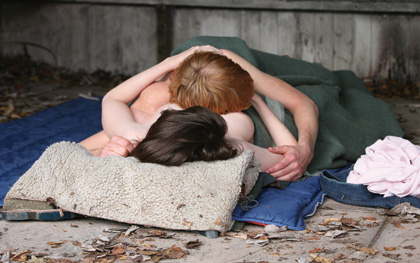
Native Son
The final programme was a reflection on the misfortune of various characters though willful ignorance, naïve deceit and forceful bullying. In David Leon and Marcus McSweeney’s Man and Boy (2010), Eddie Marsan played a man harassed first by a mischievous teenager, then the boy’s brutal father (Geoff Bell). Marsan’s character has the misfortune to encounter the boy in the first place, but his eventual tragedy is as much a product of the father’s aggression as it is bad luck. Bell’s outraged curses as he screams vengeance makes Marsan’s subsequent actions perfectly understandable.
Jonathan Caouette’s All Flowers in Time (dated 2011) was less comprehensible. The director of experimental documentary Tarnation (2003) offered a heady mix that crammed in hypnotic Dutch TV, a shape-shifting Chloë Sevigny, red-eye photography and hidden demons. Still, Caouette entertains magnificently. At one point he draws out a shock effect to such an extreme that the audience I watched it with were squirming and laughing with dreaded anticipation.
But the best (short) film of the night, and probably the year, was Scott Graham’s Native Son (2010), in which Sean Harris plays a lonely farm labourer whose failed marriage has led to his ostracism by his local community. To reveal more would ruin Graham’s non-judgemental handling of this disturbing story. The LFF doesn’t offer a prize for shorts at the moment, but if it did my money would be on this one. It plays at Bristol’s Encounters festival in mid-November.
See also
Bedlam in brief: Nick Bradshaw picks a hatful of the best movies at Bristol’s Encounters Short Film Festival (November 2009
Sonic youth: Sam Davies on Jonathan Caouette’s All Tomorrow’s Parties (November 2009)
Tell it to the camera: B Ruby Rich on Jonathan Caouette’s Tarnation
